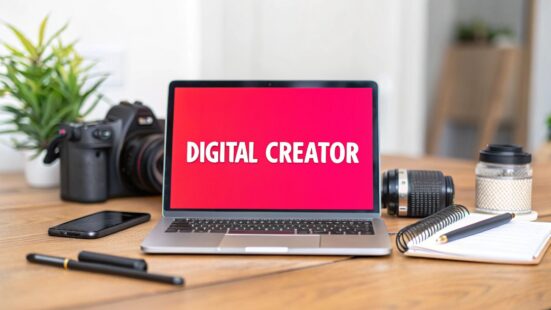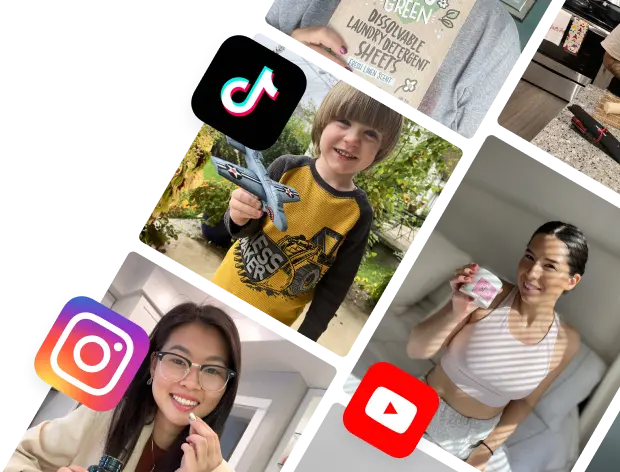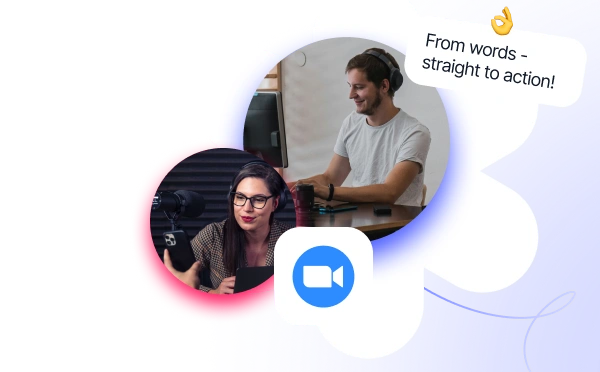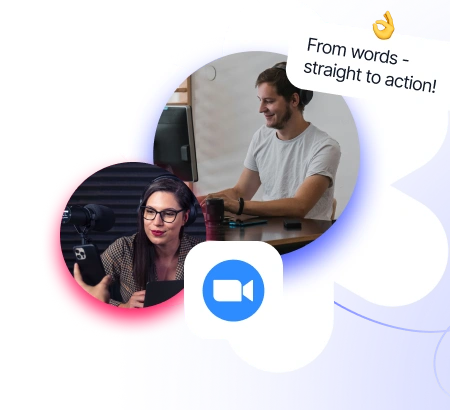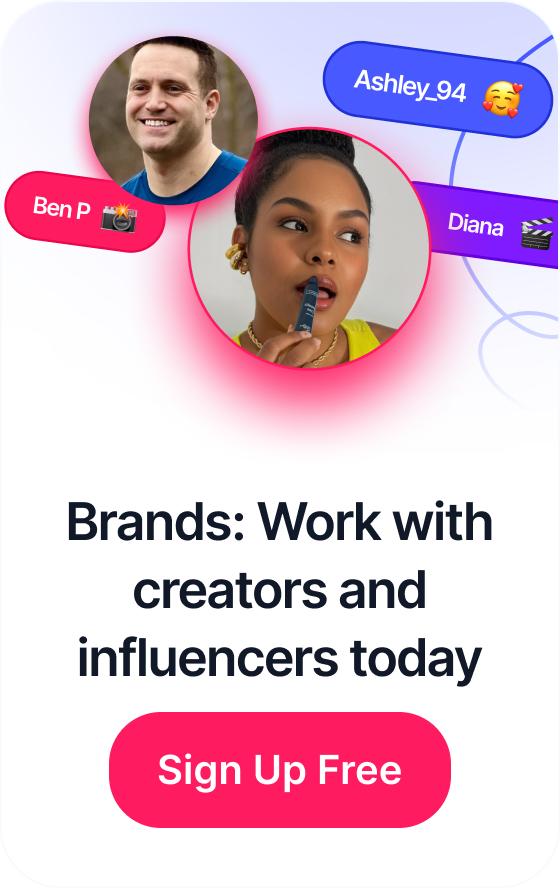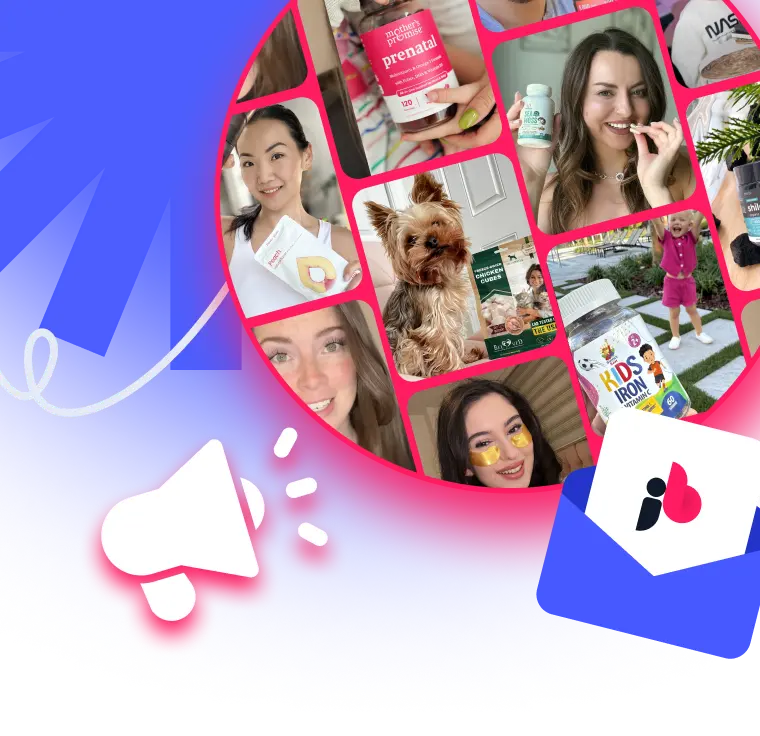 Mastering the Content Approval Process
Mastering the Content Approval Process
A digital creator is way more than just someone who posts stuff online. Think of them as the architects of the internet—people who dream up and produce original, valuable content that people actually want to consume. This could be anything from videos and podcasts to stunning photography and insightful articles.
They are storytellers, entrepreneurs, and community builders all rolled into one, managing the entire creative process from that first spark of an idea all the way to engaging with their audience and making a living from it.
Table of Contents
Understanding The Modern Digital Creator

This isn't just a buzzword; the term "digital creator" defines a modern professional who literally builds a brand from their passion. You can think of them as multifaceted business owners whose main product is the content they share with the world.
Their job isn't just about hitting "publish." It's a full-blown strategic operation that involves creating, producing, distributing, and managing a community. This holistic approach is what truly sets them apart and lays the groundwork for a sustainable career. A true digital creator is deeply invested in every single aspect of their online presence.
The Core Roles Of A Digital Creator
At its heart, a digital creator blends artistry with some serious business savvy. These individuals aren't just artists waiting for inspiration to strike. They're also sharp marketers, data analysts, and project managers who wear a ton of different hats to bring their vision to life.
Let's break down what a digital creator really does day-to-day. The table below gives a quick look at the multifaceted responsibilities they juggle to build their brand and community.
The Core Roles of a Digital Creator
| Role | Primary Function |
|---|---|
| Content Strategist | Planning content calendars, researching trends, and developing concepts that resonate with their niche and audience. |
| Producer & Editor | Actively creating the content—filming, writing, recording, and editing it all into a polished, high-quality final product. |
| Community Manager | Fostering a real community by responding to comments, running polls, and building genuine connections with followers. |
| Business Developer | Exploring revenue streams like brand partnerships, ad revenue, selling digital products, or affiliate marketing. |
As you can see, it's a dynamic role that requires a unique mix of creative talent and entrepreneurial spirit. They have to keep all these plates spinning to succeed.
A digital creator is someone who focuses on building a community of followers, engaging with their audience, and sharing their often unique perspective on a subject.
For anyone looking to carve out their own path in the creator economy, it helps to understand that there are different specialties. Some, for example, focus entirely on user-generated content. Learning about becoming a UGC content creator can shine a light on one specific, and very popular, career track.
And as any creator grows, they eventually face the same challenge: figuring out how to scale content creation without sacrificing the quality and consistency that got them there in the first place.
The Journey from Hobbyist to Economic Force
The digital creator wasn't born overnight. Think back to the early days of the internet—a time of clunky forums and personal blogs. That’s where it all started. Passionate hobbyists, driven by a love for niche topics like vintage cameras or obscure coding problems, simply wanted to connect with people who shared their interests. Making money wasn't even on the radar.
Then came the game-changers: platforms like YouTube and Instagram. Suddenly, anyone with a camera and an internet connection had a global broadcasting tool in their pocket. This completely blew the doors open for content creation, turning personal passions into something that could actually be a career.
The Birth of the Creator Economy
As these platforms exploded in popularity, something interesting started to happen. Creators built massive audiences, and an entirely new economic model began to form around them. This wasn't just about sharing anymore; it was about building a real business. Making that leap from a hobby to a full-blown career requires mastering proven strategies to grow an online business and figuring out how to genuinely serve an audience.
This shift gave rise to what we now call the creator economy—an entire ecosystem where creators can make a living directly from their content. We’re talking revenue from ads, brand deals, merchandise, and even direct support from fans on platforms like Patreon. It was a massive power shift, moving influence away from traditional media giants and into the hands of individuals.
The creator economy isn't just a buzzword. It’s a fundamental change in how we create, share, and pay for content. It puts individual creators at the center of their own powerful economic engines, turning personal brands into legitimate enterprises.
A New Economic Powerhouse
Just how big is this shift? The numbers are pretty staggering. The creator economy was valued at an estimated $250 billion globally in 2023. To put that in perspective, that’s on par with some major, long-established industries.
And it’s not slowing down. Projections show the market is on track to nearly double, potentially hitting a whopping $480 billion by 2027. This explosive growth cements the digital creator’s journey—from a niche hobbyist tapping away on a keyboard to a major economic and cultural force. If you want to see the full picture, these creator economy statistics really highlight the scale of this transformation.
This journey gets to the heart of what a digital creator really is: not just an artist, but an entrepreneur who has built an entirely new sector of the global economy from the ground up, one authentic piece of content at a time.
Digital Creator vs Influencer: What's the Difference?
You’ll often hear the terms “digital creator” and “influencer” used like they mean the same thing, but if you look closer, they’re actually two different sides of the same coin. The real distinction comes down to one core idea: creation versus curation.
Think of a digital creator as a chef. Their passion is rooted in dreaming up original recipes from scratch—crafting something valuable and unique that simply didn't exist before. Their reputation is built on the quality of what they produce, whether that's a detailed YouTube tutorial, a cinematic short film, or a deeply researched blog post. They are the artists and architects of their digital worlds.
An influencer, on the other hand, is more like a trusted food critic. While they certainly create content, their primary strength comes from the reputation and trust they've built with their audience. They use that influence to recommend, or "curate," experiences, products, or ideas. Their value isn’t just in what they make, but in their ability to shape opinions and drive action, making them powerful partners for brands.
This image breaks down some of the essential tools both creators and influencers rely on to bring their work to life.
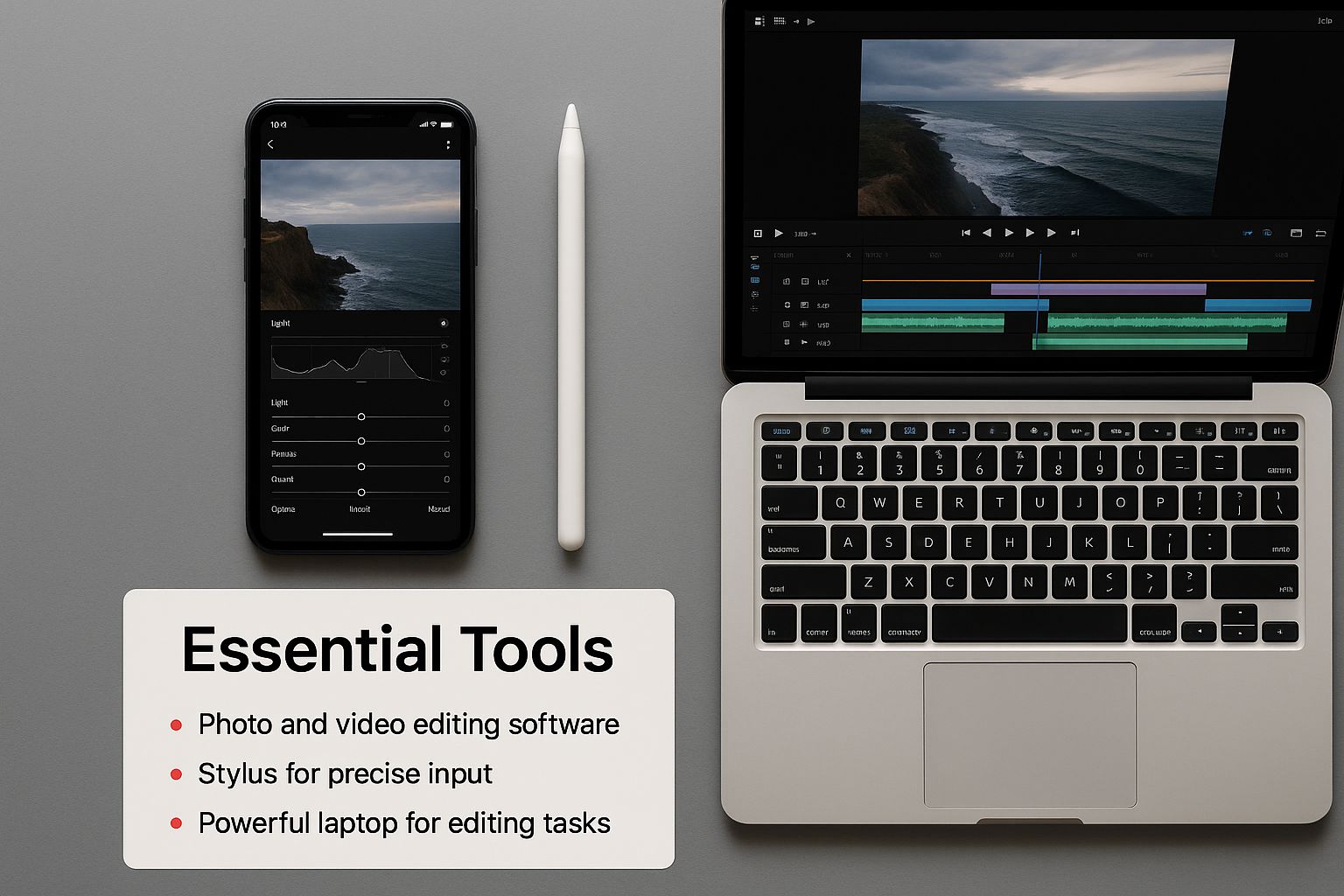
The image really highlights the modern creator's toolkit, showing how technology like smartphones and editing software has become central to turning ideas into reality.
Goals and Success Metrics
A creator's main goal is to build a genuine community around their work. They measure success by looking at things like content engagement, mastering their craft, and growing a loyal audience that comes back for their original output. The long-term play is usually to build a sustainable business from their creative passions.
In contrast, an influencer's primary objective is to maintain and grow their sway over their audience’s decisions. For them, success is often measured by:
- Conversion rates on sponsored posts.
- Follower growth and overall audience reach.
- Brand partnership opportunities and campaign results.
Of course, these lines are often blurred. Many of today's most successful online personalities are hybrids, blending original content with strategic influence. To get a better sense of how these roles intersect, you can dive deeper into the specifics of the influencer role and its impact.
To make this distinction crystal clear, here’s a simple breakdown of how the two roles stack up against each other.
Digital Creator vs Influencer: A Side-By-Side Comparison
This table highlights the fundamental differences in focus, metrics, and audience relationship between a digital creator and an influencer.
| Attribute | Digital Creator | Influencer |
|---|---|---|
| Primary Focus | Creating original content (videos, art, articles) | Curating and recommending products/experiences |
| Main Goal | To build a community around their craft | To guide audience purchasing decisions |
| Success Metrics | Engagement, skill mastery, audience loyalty | Conversion rates, follower growth, reach |
| Audience Relationship | Valued for their unique skills and output | Trusted for their taste and recommendations |
While the table shows two distinct paths, remember that the most effective online personalities often borrow strengths from both columns.
The key takeaway is this: A creator’s value is in what they make. An influencer’s value is in how they persuade. One is defined by the originality of their output, the other by the power of their voice.
Ultimately, understanding this difference is crucial. It helps clarify the unique value each person brings to the table and illuminates the different career paths available within the creator economy. Whether someone is focused on making or recommending, both roles are powerful forces in shaping modern culture and commerce.
The Essential Skills Every Creator Needs to Succeed
Thriving as a digital creator is about more than just having a cool idea. It requires a potent mix of raw creative talent, solid technical skills, and a sharp business mind. Think of it like a chef: you can have an amazing recipe, but if you don't know how to cook or run a kitchen, it'll never become a successful restaurant. The same principle applies here.
At the very heart of it all is creativity. This isn't just about dreaming up unique concepts, but being able to bring them to life through masterful storytelling and captivating visuals. Whether you're scripting a video that hooks viewers in the first three seconds or designing an Instagram post that stops the scroll, the ability to forge an emotional connection is non-negotiable.
Mastering the Technical Toolkit
That creative spark needs fuel, and that's where technical proficiency comes in. These skills are the bridge between a brilliant idea and a polished piece of content that actually reaches an audience. Creators have to be comfortable with the tools of their trade.
Here are a few of the core technical abilities:
- Video and Audio Editing: This is about turning raw footage and sound into a professional-grade experience using software like Adobe Premiere Pro or Final Cut Pro.
- Graphic Design: You need to create stunning visuals, from click-worthy thumbnails to cohesive branding assets, with tools like Canva or the Adobe Creative Suite.
- Search Engine Optimization (SEO): It’s crucial to understand how to get your content seen on platforms like YouTube and Google. Good SEO is what drives organic traffic and helps the right people find you.
Without these skills, even the most amazing content can get lost in the noise.
Success as a digital creator isn't about being an expert in everything at once. It's about developing a solid foundation in creative, technical, and business skills, and then continually learning and adapting as platforms and audiences evolve.
Developing Business Acumen
Finally, what separates the hobbyists from the pros is business sense. The most successful creators are, at their core, entrepreneurs. They know how to read analytics to understand their audience, figuring out what content pops off and, more importantly, why.
They also get the importance of brand strategy, building a recognizable identity that people trust. On top of that, they develop sharp negotiation skills to land brand partnerships and collaborations that align with their values and pay the bills. This entrepreneurial drive is what turns a creative passion into a sustainable business, cementing a creator's place as a genuine economic force.
How Digital Creators Actually Make Money

So, how does someone turn a passion for creating content into a real, sustainable career? It's a lot more complex than just racking up views and hoping for a check. The truth is, successful creators are sharp entrepreneurs. They build a smart mix of different income streams so they're never at the mercy of a single platform's unpredictable algorithm.
Think of it like a healthy investment portfolio. You wouldn't put all your money into one stock, right? Creators apply that same logic to their business, spreading their efforts across various revenue sources to build stability and long-term security.
This diversified approach is more critical than ever. The global digital content creation market was already worth around $27.1 billion in 2023 and is on track to blast past $63 billion by 2030. That explosion of growth means there are huge opportunities for creators who know how to monetize their work effectively, as shown in these in-depth digital content creation statistics.
Direct Platform Monetization
The most obvious way creators get paid is directly from the platforms where they post their content. These are usually the first revenue streams they tap into when they're just getting started.
- Ad Revenue: This is the classic model. Platforms like YouTube share a slice of the advertising pie with creators through programs like the YouTube Partner Program.
- Creator Funds: To keep top talent on their apps, platforms like TikTok and Instagram have set up funds that pay creators based on how well their content performs.
- Subscriptions and Tipping: Features like Twitch subscriptions, YouTube Channel Memberships, and various tipping tools let audiences support their favorite creators directly with cash.
While these are great for getting your foot in the door, they can be wildly unpredictable. An algorithm change or a new policy can cause income to swing dramatically overnight.
The smartest creators never rely solely on platform-based income. They use it as a foundation to build a much larger, more resilient business model that gives them direct control over their revenue.
Beyond the Platform: Brand Partnerships and Products
This is where creators really start to call the shots and build a lasting business. By moving beyond what the platforms offer, they forge direct connections with their audience and other companies, unlocking more stable and often more lucrative ways to earn.
A huge piece of this puzzle is affiliate marketing, where creators earn a commission for promoting a company's products. For anyone serious about this path, checking out the best affiliate marketing platforms for creators is a fantastic starting point to see how powerful this channel can be.
Here are a few other popular ways creators build their financial independence:
- Brand Sponsorships: Teaming up with brands for sponsored posts or dedicated videos is often one of the biggest moneymakers for established creators.
- Digital Products: They can package their expertise into things like e-books, online courses, or downloadable templates, creating an asset that sells over and over.
- Merchandise: Selling branded gear, from t-shirts and hoodies to custom accessories, is a great way to monetize a personal brand and give the community something tangible.
- Services: Many creators leverage their skills by offering consulting, coaching, or freelance services directly to clients.
Understanding the Global Impact of the Creator Economy
To really wrap your head around what a digital creator is today, you have to zoom out and see the bigger picture. The creator economy isn't some niche trend happening in a quiet corner of the internet. It's a massive, worldwide economic shift that's changing how global markets work from the ground up.
We're not just talking about a handful of viral stars. This is about millions of individuals building real, sustainable businesses and forming a powerful new economic sector.
This global movement is rewriting the rules for media, commerce, and culture. Creators are the new tastemakers and community builders, driving trends and swaying consumer behavior on a scale that rivals traditional institutions. They're building entire micro-economies around their personal brands, creating jobs, and even inventing new markets for products and services.
A Worldwide Economic Engine
The sheer scale of this movement is mind-boggling. What began as a loose collection of individuals sharing their passions online has exploded into a serious economic force with global reach. And this growth isn't just happening in one region; it's a worldwide surge.
Right now, there are over 207 million content creators across the globe, each one adding to this dynamic ecosystem. Projections show that North America's creator economy is on track to rocket from $34.12 billion in 2025 to an incredible $277.41 billion by 2032.
Meanwhile, the Asia-Pacific market is expected to grow from $26.16 billion to $75.28 billion in the same timeframe. These numbers make it crystal clear: digital creators have become vital economic drivers on an international stage. You can dig into more of the data on these creator economy growth projections.
The creator economy is a borderless phenomenon. It empowers individuals from any country to build a global audience and participate in a new digital marketplace, shifting economic power from legacy corporations to independent creators.
This international impact proves that being a digital creator is about far more than just having an online personality. These individuals are entrepreneurs at the forefront of a global economic transformation, showing the world that passion, creativity, and community can build powerful, lasting businesses anywhere.
Got Questions About Digital Creators?
Thinking about jumping into the world of digital creation? It’s natural to have a bunch of questions. To help clear things up and build on what we’ve already covered, here are some straightforward answers to the most common queries people have about this exciting field.
How Do I Start a Career as a Digital Creator?
The first step is figuring out what you’re genuinely passionate about—that’s your niche. From there, it's a mix of smart planning and just doing the work. You'll want to map out a basic content strategy, get your hands on some gear (which can be as simple as your smartphone), and then start creating and sharing your stuff consistently.
What Role Does Technology Play in This Field?
Honestly, technology is everything. It’s the engine that powers digital creation, giving creators the tools they need to bring ideas to life and get them in front of an audience.
- Software: Getting comfortable with video editing software, graphic design tools, and maybe a content management system is pretty fundamental.
- Platforms: You have to learn the game. Understanding how platforms like YouTube, Instagram, and TikTok work is key to growing your audience.
- Analytics: Using tools to track how your content performs is non-negotiable. This data shows you what’s working and helps you fine-tune your strategy.
At the end of the day, tech is what allows creators to produce quality work and distribute it where it matters.
The most successful creators are really entrepreneurs in disguise. With over 50 million people now calling themselves digital creators, it's a crowded space. A business-minded approach is what helps you stand out and build something that lasts.
Are Digital Creators Limited to Specific Content Types?
Not even close. The best part about being a digital creator is the sheer variety. People are doing everything imaginable, from producing deep-dive educational podcasts and writing detailed articles to making hilarious short-form videos and crafting incredible digital art.
The field is wide open, which means you can forge a path that perfectly matches your own skills and what you love to do. This flexibility is a huge part of what digital creator meaning is all about today.
Ready to connect with a diverse network of talented creators? JoinBrands makes it simple to find the perfect partners for your next campaign. Launch your campaign and discover top-tier talent today
